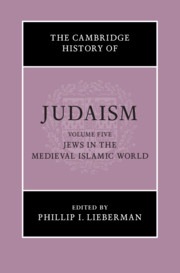Book contents
- The Cambridge History of Judaism
- The Cambridge History of Judaism
- The Cambridge History of Judaism
- Copyright page
- Contents
- Figures
- Acknowledgments
- Introduction
- Part I Jews in the Medieval Islamic World
- Part II Social and Institutional History
- Part III Spiritual and Intellectual History
- Chapter 17 Karaism
- Chapter 18 Non-Rabbinic and Non-Karaite Religious Movements
- Chapter 19 Languages and translation
- Chapter 20 Book Production
- Chapter 21 Jewish Bible Exegesis in Muslim Lands in the Middle Ages
- Chapter 22 Jewish Law
- Chapter 23 Liturgy
- Chapter 24 Piyyuṭ
- Chapter 25 Jewish Philosophy
- Chapter 26 Science and Medicine
- Chapter 27 Magic
- Chapter 28 Mysticism
- Chapter 29 Belles Lettres
- Chapter 30 Jewish-Muslim Polemics
- Chapter 31 Historiography
- Chapter 32 Material Culture, Art, and Architecture
- Index
- References
Chapter 29 - Belles Lettres
from Part III - Spiritual and Intellectual History
Published online by Cambridge University Press: 21 August 2021
- The Cambridge History of Judaism
- The Cambridge History of Judaism
- The Cambridge History of Judaism
- Copyright page
- Contents
- Figures
- Acknowledgments
- Introduction
- Part I Jews in the Medieval Islamic World
- Part II Social and Institutional History
- Part III Spiritual and Intellectual History
- Chapter 17 Karaism
- Chapter 18 Non-Rabbinic and Non-Karaite Religious Movements
- Chapter 19 Languages and translation
- Chapter 20 Book Production
- Chapter 21 Jewish Bible Exegesis in Muslim Lands in the Middle Ages
- Chapter 22 Jewish Law
- Chapter 23 Liturgy
- Chapter 24 Piyyuṭ
- Chapter 25 Jewish Philosophy
- Chapter 26 Science and Medicine
- Chapter 27 Magic
- Chapter 28 Mysticism
- Chapter 29 Belles Lettres
- Chapter 30 Jewish-Muslim Polemics
- Chapter 31 Historiography
- Chapter 32 Material Culture, Art, and Architecture
- Index
- References
Summary
The prominence of poetry and other kinds of literary work in which the skill displayed in the writing contends for attention with the work’s contents was an outstanding feature of Judeo-Arabic society in our period and one that distinguishes this society from all earlier and most succeeding Jewish societies until the nineteenth century. Arabic-speaking Jewish writers, in the period covered by this volume, produced literary works of lasting appeal not only because some were profound thinkers, sensitive souls, or linguistically gifted individuals, but because Arabo-Islamic society created institutions in which artistic writing played an important public role, thereby encouraging the cultivation of elegant language and literary craftsmanship among its subject peoples as well. Poetry and fine writing were first and foremost instruments of public life and secondarily of upper-class social life and entertainment. The literary forms cultivated for these purposes were vehicles for the expression of communal attitudes as well as individual writers’ personal views and even inner experience. The age of Judeo-Arabic ascendancy produced, for the first time in Jewish history, something we can recognize as literature, in the artistic sense of the word.
- Type
- Chapter
- Information
- The Cambridge History of Judaism , pp. 923 - 945Publisher: Cambridge University PressPrint publication year: 2021

